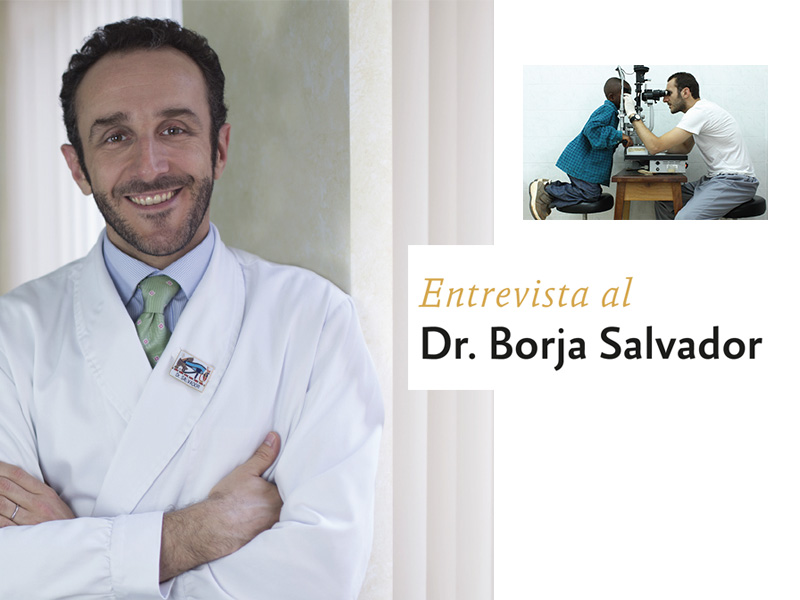Vitreoretinal complications in high myopia
09/01/2026

26/12/2017
Dr. Borja Salvador trained as a resident in the Barraquer Ophthalmology Centre. After finishing his specialisation in the year 2009, he worked as a Clinical Research Fellow in Boston for five years and a Clinical Fellow in Newcastle-upon-Tyne for one year. He came back to the Centre as a member of the Cornea and Refractive Surgery Department in October 2016.
Why did you decide to study Medicine? Did your family influence your decision in any way?
Studying medicine was such a natural decision for me. I'm from a family of doctors, and, after dreaming of becoming a footballer, fireman or superhero, like all little boys do, I didn't consider anything else other than becoming a doctor. I always loved talking about clinical cases and experiences with my parents around the dinner table.
When did you decide to specialise in ophthalmology?
Initially I wanted to be a gynaecologist, as it's a medical and surgical specialism that combines general surgery and yet you still have contact with the patient. However, when I walked into the theatre at the Barraquer Centre of Ophthalmology for the first time, it was "love at first sight". The late Prof. Joaquín Barraquer was there performing a cataract operation while they were operating on a retina in the room next door. At that moment I knew that was what I wanted to do for the rest of my life.
What were the years as a resident like in the Barraquer Ophthalmology Centre? Do you have any special memories in particular?
The residency is a period in the life of any doctor where you experience all sorts of conflicting feelings in a very intense way. And looking back on these years, you learn to value all these experiences, especially the not so good ones that helped you to grow as a person and a doctor too. I have some really great memories of those years, but perhaps the excellent friends I made stand out the most.
What made you go for your sub-specialism? What led you to go abroad?
Deciding on my sub specialism wasn't really a question of what but rather who. In my third year as a resident, I was humming and hawing between the retina and the cornea, and by the end of the rotations with Prof. Rafael Barraquer and Dr. Juan Álvarez de Toledo, I decided to go for the anterior segment.
When I finished my residency, I had the feeling that I should go abroad and learn other ways of doing things, and then come back and contribute everything I had learnt to the Centre. Leaving home is a very enriching and recommendable experience for any young doctor who is starting out.
What part of your medical experience in the United States and England would you highlight?
In terms of professional practice, my experience in the USA opened my eyes to a whole world that was unknown to me until then: research. I learnt how hard and frustrating it was to try to prove that your ideas work and can improve the quality of life of your patients. Still, it's a fascinating world that hooks you. I was lucky enough to have two exceptional mentors: Dr. Claes H. Dohlman and Dr. Daniel S. Kohane, who I am very grateful for. In addition, working in two internationally acclaimed labs gave me the chance to work with colleagues of different nationalities who worked in different fields of discipline (chemists, biologists, engineers, etc.). I learnt so much from them.
Personally speaking, my experience in the USA gave me practically everything I have today. I met my wife Evi in Boston and my two kids Niko and Aleko were born there. So, even though I was Barcelona born and bred, I'm now a Bostonian at heart.
Lastly, my experience in England allowed me to go back to clinical practice and complete my training as an ocular surface and cornea specialist. It lasted almost two very intense years, far from my family, working very long hours. But I was lucky enough to meet fantastic colleagues who welcomed me with arms wide open, and who are still great friends.
What's your typical working day like at the Barraquer Centre of Ophthalmology? What do you like most about this profession?
Intense, busy and gratifying — all in equal measure. I'm lucky enough to combine clinical practice with teaching and research. Although it may sound like a cliché, what I like most about my job is dealing with the patient. The instant when you remove the bandage from the operated eye and you see their happy face is still so moving to me.
With such an intense job, what do you do to relax?
I mainly play sports and music and spend time with my family and friends. I'm a fan of mid- and long-distance running, so I'm training to run my first marathon.
You recently went on a trip to Africa with the Barraquer Foundation. What part of the trip stood out for you?
The marvellous team with whom I shared such an intense week of work: José, Maite, Nacho, Esther, Jorge, Idoya, Alfonso, Ignasi and Xavi. We were just like one big family in which each of us played a special part in making the trip a success. Furthermore, the experience showed me how much we worry about such trivial things in our society, while there are people out there who have a lot less and are a lot happier.